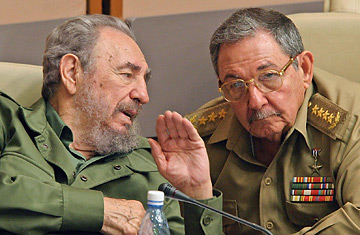
Fidel Castro (L), Raul Castro
Few would argue that democracy and human rights are as rare in Cuba as meat and modern appliances. That was duly underscored on Wednesday when President Bush invited the relatives of jailed Cuban dissidents to the State Department for his first policy speech on Cuba in four years. But any expectation of a major policy shift was dissipated after listening to the President. Bush simply gussied up some of the same old bromides — "The socialist paradise is a tropical gulag" — that have marked U.S.-Cuban relations for decades.
Bush reiterated his hard stance against lifting the 45-year-old U.S. trade embargo on Cuba if the seriously ill Fidel Castro, as expected, is succeeded by his brother Raul, who already runs the government. Predictably, Fidel said Bush's speech reflected the U.S.'s desire to "reconquer" Cuba. And the Castro brothers aren't exactly cowed by these traditional verbal assaults. They have thrived on it in the past: heated U.S. rhetoric usually bolsters their image at home as the island's anti-Yanqui defenders. With plenty of material support from Hugo Chavez in Venezuela (about 90,000 barrels of oil per day on highly favorable finance terms), the embargo, though still onerous, is not as painful as it once was.
As a result, critics of Bush's Cuba policy argue his address simply helped preserve rather than undermine Cuba's nebulous status quo. And they're urging Washington again to consider stepped-up contact with Raul Castro — widely regarded as more pragmatically flexible than Fidel — as a more effective means of jump-starting a democratic transition. "President Bush is right when he says this is a unique moment in Cuba, but he's missing that moment," says Jake Colvin, director of USA Engage in Washington, which favors moves like lifting the ban on U.S. travel to Cuba — something even most Cuban-Americans in Miami now favor, and which many Cuba watchers suggest the Castros actually fear. Bush insisted that engaging Cuba now would just give "oxygen to a criminal regime." But, argues Colvin, "American citizens have always proven the best ambassadors of freedom and democracy."
Bush may also be alienating the very people he is reaching out to by suggesting Washington will be Cuba's post-Castro arbiter. In the eyes of ordinary Cuban citizens, that is perceived as surrogacy for the Miami Cuban exile community — whose anti-Castro hardliners, with their dreams of resurrecting a pre-Castro Cuba, are as disliked by many Cubans on the island as the Castros themselves are.
What's more, by attaching his Administration to Cuba's dissidents so publicly, Bush may actually compromise the position of the Castro critics who remain on the island, whose credibility often rests on being seen as a movement independent of the Miami exiles. In past interviews with TIME and other media groups, Oswaldo Paya, an engineer who is the most prominent of Cuba's dissidents, says he is uncomfortable whenever the White House tries to co-opt him and his colleagues. He says it simply makes their goals more difficult to achieve.
